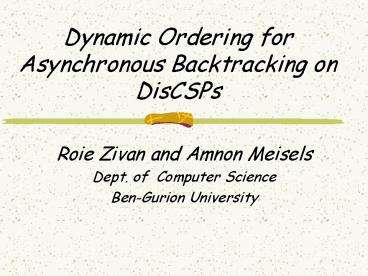Dynamic Ordering for Asynchronous Backtracking on DisCSPs - PowerPoint PPT Presentation
1 / 24
Title:
Dynamic Ordering for Asynchronous Backtracking on DisCSPs
Description:
Each agent holds exactly one variable. The constraints ... [Gomez et. al 2002 2005] 11/14/09. Dynm Ordr ABT - DCR-05. 4. Motivation for dynamic reordering ... – PowerPoint PPT presentation
Number of Views:51
Avg rating:3.0/5.0
Title: Dynamic Ordering for Asynchronous Backtracking on DisCSPs
1
Dynamic Ordering for Asynchronous Backtracking on
DisCSPs
- Roie Zivan and Amnon Meisels
- Dept. of Computer Science
- Ben-Gurion University
2
Asynchronous Backtracking
- Simplifying Assumptions
- Each agent holds exactly one variable
- The constraints network is a full graph (p1 1)
- Every agent can send messages to any other agent
3
ABT Strong Assumption
All Agents are ordered by a fixed order of
Priorities Yokoo 92-2000 BesBrMes 2001
2005 Hammadi 98 2002 Gomez et. al 2002
2005
4
Motivation for dynamic reordering
- Results of recent studies of sequential assigning
algorithms for DisCSPs
Nguyen Faltings 2004
Brito Meseguer 2004
5
Reordering Asynchronous Backtracking
- Asynchronous Weak Commitment - AWC
- Yokoo 95 - 2000
- (exponential space)
- Hybridizing ABT and AWC into a polynomial space,
complete protocol. - Silaghi and Faltings 2001
- (complex algorithm with unrewarding results)
6
Reordering sequential assignments algorithms
1
2
3
4
7
Reordering sequential assignments algorithms
1
2
3
4
4
3
8
Reordering sequential assignments algorithms
1
2
4
3
4
2
4
3
3
9
Reordering sequential assignments algorithms
- Highlights
- Moving forward - choose a desirable order
- Backtracking is done in the same order as the
forward moves
Same idea can be applied in Asynchronous
Backtracking
10
Ordering Rules for Agents in ABT
- Change order only when changing assignment
- Enforce reordering only on Agents with lower
priority
11
ABT with Dynamic Ordering
A1,2,A2,1, A4,1
A1,A3,A2,A4
A3 ? 1
A3 1
12
ABT with Dynamic Ordering
A1,2,A2,1, A4,1
A1,A3,A2,A4
A1,A3,A4,A2
A1,A3,A4,A2
A3 2
A3 2
13
Which order is most up-to-date?
- Time-Stamping method of Nguyen Faltings 2004
- Each order is time-stamped
- A time-stamp is an array of integers of size n,
all initialized to 0 - Each agent that assigns its variable, updates the
time-stamp as follows - Counters of higher priority agents are untouched
- The counter of the assigning agent is incremented
by 1 - The counters of lower priority agents are set to
zero - Time-stamps are compared lexicographically
14
ABT with Dynamic Ordering
A1,1,A3,1,A2,3,A4,2
A3 ? 1
A3 1
15
ABT with Dynamic Ordering
A1,1,A3,1,A2,3,A4,2
A1,1,A3,1,A2,3,A4,2
A1,1,A3,1,A4,2,A2,3
A1,1,A3,2,A4,0,A2,0
A1,1,A3,1,A2,3,A4,2
A3 2
16
Correctness proof (outline)
- Assumption Standard ABT is correct
- Induction on the number of agents (n)
- Assumption for every k lt n, the algorithm is
correct - For a single agent trivial
- For a DisCSP with n agents, assign the first
agent and set an order for the rest - The induced DisCSP is of size n 1 and the
completeness holds (by induction) - Now assign the second value to the first
variable
17
Choosing the right heuristic
- Heuristics that work well for sequential
assignment algorithms fail for ABT_DO
(min-domain) - After each change of order, relevant Nogoods
are discarded - Nogood-triggered heuristic Ginsberg-93
- Agent changes its current order only when it
receives a Nogood which causes an assignment
change - The Nogood sender is moved to a place immediately
following that of the assigning agent - The only agent that moves up has no conflicts
with any lower priority ? no Nogoods are removed
18
ABT_DO - Different Heuristics (20 Agents p1
0.4)
19
ABT_DO - Different Heuristics (20 Agents p1
0.4)
20
ABT_DO - Different Heuristics (20 Agents p1
0.7)
21
ABT_DO - Different Heuristics (20 Agents p1
0.7)
22
Conclusions
- Dynamic Variable/Agent reordering is a powerful
tool in CSP solving algorithms - Most previous studies of asynchronous
backtracking used a fixed order of agents - Dynamic reordering for ABT with polynomial space
can be achieved and implemented - The heuristic must take into consideration the
loss of valid Nogoods - A Nogood-triggered heuristic, avoids Nogoods loss
and improves the performance by a large factor
23
A Distributed Constraint Network
24
Asynchronous Backtracking
- Motivation
- Concurrent computation.
- HighLights
- Agents always hold an assignment which is
consistent with their view of the system. - On backtrack operations, agents change their
views by eliminating inconsistent values.































